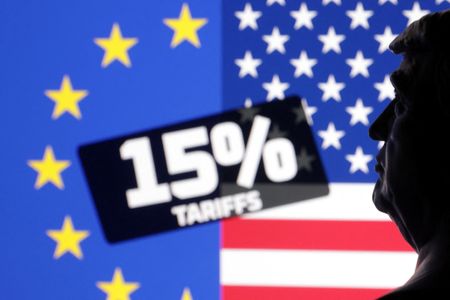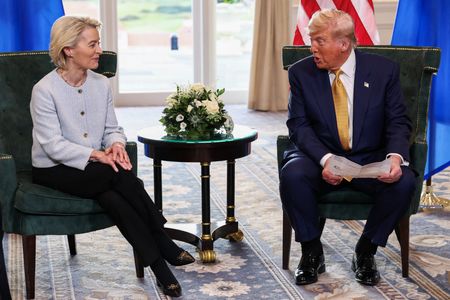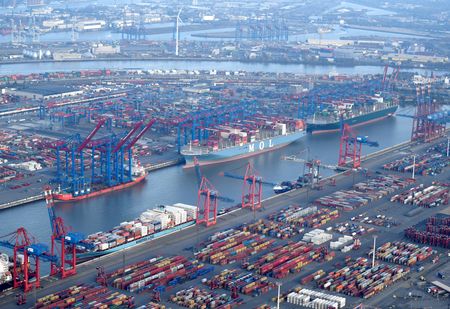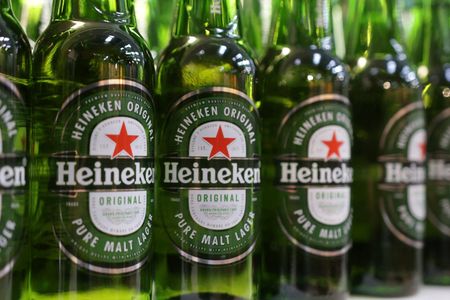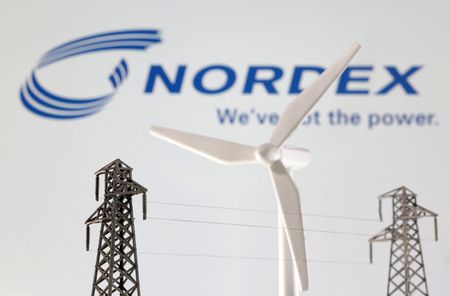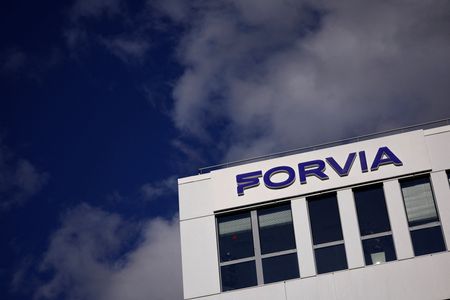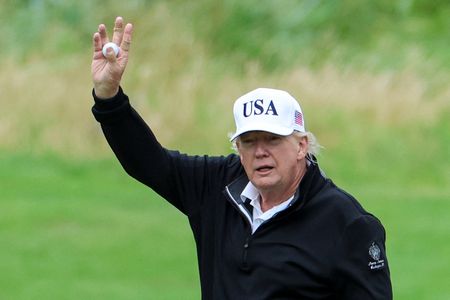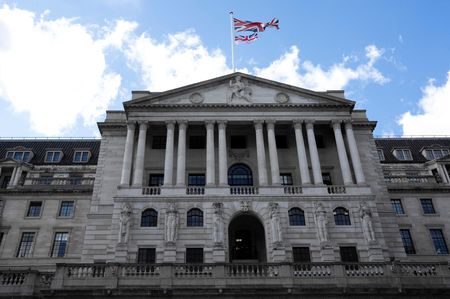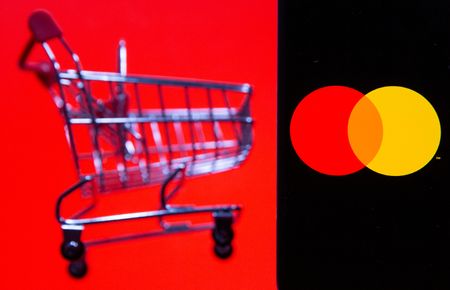TURNBERRY, Scotland/SINGAPORE (Reuters) -U.S. President Donald Trump said on Sunday the United States and the European Union had reached agreement on a trade deal that includes a 15% tariff on EU goods entering the U.S. and significant EU purchases of U.S. energy and military equipment.
The deal also calls for $600 billion in investments in the U.S. by the EU, he told reporters.
This follows a U.S. deal with Japan on July 23 that cut tariffs on auto imports and other goods in exchange for a $550 billion package of U.S.-bound investment and loans.
Markets cheered the news, with European futures rising sharply on Monday. EUROSTOXX 50 futures and DAX futures jumped more than 0.9% each, while FTSE futures gained 0.56%.
Nasdaq futures were last up 0.52% while S&P 500 futures advanced 0.4%.
The euro edged 0.22% higher to $1.1765.
Following are comments from markets to the announcement.
COMMENTS:
KRISTINA CLIFTON, SENIOR ECONOMIST, COMMONWEALTH BANK OF AUSTRALIA, SYDNEY:
“It’s a lot better than a worst-case scenario, but it’s still a headwind for the global economy.
“We still have this deadline of the 1st of August, so there’s still plenty of countries that haven’t reached a trade deal with the U.S. yet…we still don’t have a trade deal between the U.S. and Canada.”
PRASHANT NEWNAHA, SENIOR ASIA-PACIFIC RATES STRATEGIST, TD SECURITIES, SINGAPORE:
“A 15% tariff on European goods, forced purchases of U.S. energy and military equipment and zero tariff retaliation by Europe, that’s not negotiation, that’s art of the deal. A big win for the U.S.”
JARROD KERR, CHIEF ECONOMIST, KIWIBANK, AUCKLAND:
“I was anticipating a much higher tariff on the EU…I was surprised on this deal. Normally we’ve been surprised the other way, but this time I think this is positive, markets view it as positive…I think we will hear more and more from various regions and countries.
“What we’re seeing here is quite clearly a Trump administration grabbing revenue, grabbing money, rather than diverting trade.”
TONY SYCAMORE, MARKET ANALYST, IG, SYDNEY:
“It’s got to be viewed as another win by Trump, the fact that he’s been able to secure deals with Japan and the EU effectively within a week, is certainly a very positive step for the White House.
“Putting it all together, what we’ve seen with Japan, with the EU, with the talks which are due to be held in Stockholm between the U.S. and China, it really does negate the risk of a prolonged trade war, and the importance of the August tariff deadline has significantly been diffused.”
HOLGER SCHMIEDING, CHIEF ECONOMIST, BERENBERG BANK, LONDON:
“The crippling uncertainty is largely over, the deal is bearable for the EU. Modestly good news for equity markets, that probably priced in most of it beforehand. The deal seems to be largely in line with the reports about a potential deal last Thursday.”
“Trump can claim that the asymmetric deal is a ‘win’ for him. But of course, the outcome is still bad relative to the situation that prevailed before Trump started his trade wars.”
BRIAN JACOBSEN, CHIEF ECONOMIST, ANNEX WEALTH MANAGEMENT, BROOKFIELD, WISCONSIN:
“President Trump said the trade deal with the EU is the biggest of all the deals. Whether it’s imports or exports, Mexico, China, and Canada are bigger deals than the EU. So, this is the biggest deal until the next one.”
“Settling into an average 20% tariff rate is better than the Liberation Day tariff rate of 25%, but it’s still a lot higher than the 2024 tariffs of 2.5%.”
“Tariffs are a stick to make it more expensive to produce outside the U.S. The One Big Beautiful Bill has a number of carrots in it to make it cheaper to produce inside the U.S. It’s a gamble to see if the stick-and-carrot approach to investing in the U.S. will work, especially since sticks tend to hurt right away while carrots take time to show their benefits.”
HASNAIN MALIK, STRATEGY HEAD OF EQUITY RESEARCH, TELLIMER, DUBAI:
“The headline 15% will be a relief for all investors, particularly for those in European manufacturing assets. In common with other ‘deals’, like the one with Japan, the devil will be in the detail, and metals is already one area of confusion, but that is something to worry about later.”
MICHAEL BROWN, SENIOR RESEARCH STRATEGIST, PEPPERSTONE, LONDON:
“The EU is going to be hit with a 15% tariff which is pretty punchy but it’s half of the 30% they were threatened with and it’s well off the 50% that Trump had been throwing around at the start of the month so that’s good news.”
“The two obvious reactions that you would expect are upside in the euro and upside in equity futures. I don’t think equities in particular needed much of an excuse to rally and now they’ve got one.”
ERIC WINOGRAD, CHIEF ECONOMIST, ALLIANCEBERNSTEIN, NEW YORK:
“This is very similar to the deal we reached with Japan.”
“We will need to see how long the sides stick to the deal. From a market perspective, it is reassuring in the sense that having a deal is better than not having a deal.”
RICK MECKLER, PARTNER, CHERRY LANE INVESTMENTS, NEW VERNON, NEW JERSEY:
“It’s really in line with the Japan deal, and I assume investors will view it positively as they viewed the Japan deal. The reality is there will be higher tariffs, which may lead to more inflation, depending on how much of it is absorbed by the manufacturers and how much of it is passed on to consumers.”
(Reporting by Matt Tracy and Caroline Valetkevitch in New York and Lucy Raitano and Karin Strohecker in London and Asia markets team; Compiled by Amanda Cooper; Editing by Alexandra Hudson, Marguerita Choy and Jacqueline Wong)

